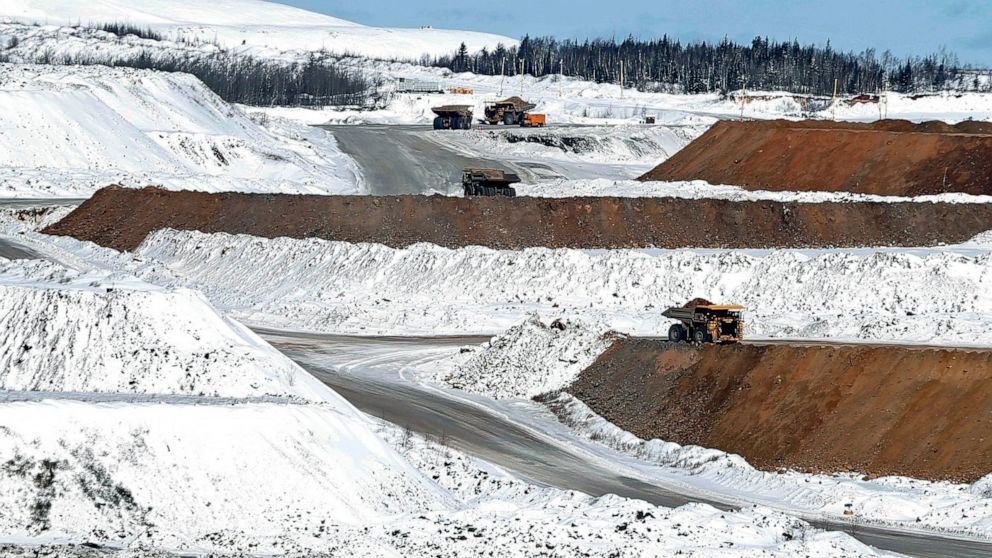Trump pushes mining with order, but effects are uncertain
The Trump administration is seeking to fast-track mining permits and offer grants and loans to help companies pay for mining equipment as part of its ongoing effort to boost the industry
BILLINGS, Mont. — The Trump administration is seeking to fast-track mining projects and could offer grants and loans to help companies pay for equipment, administration officials said Thursday, as they offered details on a plan that critics said could spoil rivers and lakes in Minnesota, Idaho and elsewhere with mining pollution.
With the election just over a month away, President Donald Trump signed an order late Wednesday declaring a national emergency over the country’s reliance on imported metals used to manufacture computers, smart phones, batteries for electric cars and other items. The order goes beyond the administration’s prior focus on so-called critical minerals that are in short supply and applies to copper, nickel and other metals widely used in manufacturing.
It’s the latest in a string of actions by the administration meant to boost the mining industry by hastening environmental reviews and shielding companies from international market pressures. How effective it will be is uncertain: Mines typically need approval from state regulators in addition to the federal government, giving opponents more than one avenue to block projects.
Trump adviser Peter Navarro described how the order could be used to transform the resource-rich Iron Range area in the election-battleground state of Minnesota from an iron mining area into a more diverse mining district, thereby lessening dependence on materials from countries such as China.
“The vision here is to turn the Iron Range in northeast Minnesota … into the copper range, the nickel range, the cobalt range, the platinum range and palladium range as well,” Navarro told reporters in a telephone briefing.
Opponents worry the proposed Twin Metals underground copper-nickel mine near Ely could ruin the pristine Boundary Waters Canoe Area Wilderness downstream, a project the Obama administration tried to kill. They’re also opposed to a separate project nearby, the proposed PolyMet mine near Babbitt. Both deposits also have smaller but economically significant amounts of cobalt, platinum, palladium and gold.
Trump’s order applies to projects nationwide, officials said, listing more than a dozen states with significant mineral deposits including California, New Mexico, Colorado, Nevada, Montana, Pennsylvania and West Virginia.
Environmentalists raised specific concerns about its implications for Minnesota’s Iron Range, the proposed Resolution copper mine in Arizona and the Midas gold mine project in Idaho.
Democratic U.S. Sen. Tom Udall of New Mexico blasted the order as a wasteful subsidy for an industry with a long history of abandoning polluted sites and leaving taxpayers with huge cleanup bills. Under the 1872 mining law that governs the industry, companies are not required to pay royalties on minerals extracted from public lands.
“For too long in the West, the mining industry has enjoyed a sweetheart deal,” Udall said. “This strange announcement goes in the complete wrong direction.”
He said the administration should be focused instead on the coronavirus pandemic and using the Defense Production Act — which Trump cited in his mining order — to instead make sure enough PPE is available for the winter.
In mining-friendly Wyoming, Gov. Mark Gordon said the order would ease permitting delays and help expand an industry that the Republican said had been hampered by a combination of underpriced foreign competition and federal government inaction.
“President Trump’s executive order will reverse that trend,” Gordon said.
Trump’s order does not itself approve any mines. It directs agencies led by the Interior Department to report back within 30 days on measures they can take to hasten mining projects, and within 60 days with recommendations for imposing tariffs or quotas on China and other U.S. mining sector competitors.
Officials did not say how much money could be distributed through grants and loans for mining equipment. But they said billions of dollars were available through the U.S. departments of Defense and Energy.
A representative of the environmental group Earthworks said the order could speed the transfer of public lands and resources to private companies. Earthworks’ Aaron Mintzes said the proposal advances “a mad rush” to advance mining projects before Trump’s term expires at the end of the year.
Environmentalists oppose both the PolyMet and the Twin Metals projects in Minnesota because of the threat of acid mine drainage from the sulfide-bearing ore.
“This could steamroll the process of putting a sulfide-ore copper mine next to the Boundary Waters,” tweeted the Campaign to Save the Boundary Waters, which is focused on Twin Metals.
———
Karnowski contributed from Minneapolis.
———
Follow Matthew Brown on Twitter: @MatthewBrownAP
![]()


